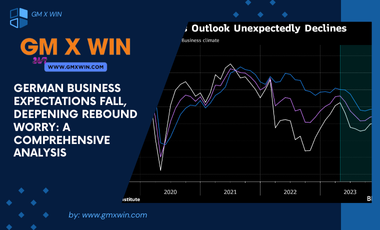Germany, Europe’s largest economy, has long been a pillar of stability and economic strength within the Eurozone. However, recent developments have raised concerns about its economic outlook. The decline in German business expectations, coupled with fears of a prolonged economic rebound, has sparked debates among economists, policymakers, and business leaders. This comprehensive article delves into the factors contributing to the fall in German business expectations, the implications for the broader European and global economies, and the potential paths forward for Germany’s economic recovery.
Overview of the German Economy
Historical Economic Performance
Germany’s economic history is marked by periods of robust growth and stability. Following the reunification in 1990, Germany emerged as a global economic powerhouse, driven by a strong industrial base, export-oriented economy, and a highly skilled workforce. The country’s economic model, characterized by its “Mittelstand” (medium-sized enterprises) and strong emphasis on manufacturing and engineering, has been pivotal in its success.
Key Economic Indicators
- Gross Domestic Product (GDP): Germany consistently ranked among the top global economies by GDP.
- Export Strength: The country is renowned for its export-driven economy, particularly in sectors such as automotive, machinery, and chemicals.
- Unemployment Rate: Historically low unemployment rates have been a feature of Germany’s labor market.
- Inflation Rate: Germany has experienced relatively stable inflation rates compared to its Eurozone counterparts.
Recent Economic Challenges
Despite its strong historical performance, Germany has faced several economic challenges in recent years:
- Global Trade Tensions: Trade disputes, particularly with major partners such as the U.S. and China, have impacted Germany’s export-driven economy.
- Brexit: The UK’s departure from the European Union introduced uncertainties affecting Germany’s trade relationships.
- Pandemic Impact: The COVID-19 pandemic disrupted global supply chains and economic activity, leading to a recession in 2020.
The Decline in Business Expectations
Current Trends
Recent data indicates a notable decline in German business expectations. This decline reflects broader concerns about the future economic trajectory and has implications for investment, employment, and overall economic growth.
Key Indicators of Decline
- Business Confidence Surveys: Surveys such as the Ifo Business Climate Index and ZEW Economic Sentiment Indicator show a decrease in business confidence.
- Investment Plans: Many businesses have scaled back or delayed their investment plans due to uncertainty.
- Hiring Intentions: A reduction in hiring intentions indicates concerns about future economic conditions.
Factors Contributing to the Decline
Several factors contribute to the decline in German business expectations:
1. Global Economic Uncertainty
Global economic uncertainties, including geopolitical tensions, trade conflicts, and supply chain disruptions, have weighed on German businesses’ confidence. The ongoing Russia-Ukraine conflict and its impact on energy prices have further exacerbated uncertainties.
Examples:
- Energy Prices: Rising energy costs have increased operational expenses for German businesses.
- Trade Conflicts: Ongoing trade disputes with major economies have affected export-oriented industries.
2. Domestic Economic Challenges
Germany faces several domestic economic challenges that impact business expectations:
Examples:
- Supply Chain Disruptions: The pandemic and geopolitical tensions have disrupted supply chains, affecting manufacturing and trade.
- Labor Market Issues: Skills shortages and labor market mismatches pose challenges for businesses seeking to expand or adapt.
3. Policy Uncertainty
Uncertainty surrounding economic policies and regulations can affect business expectations:
Examples:
- Fiscal Policy: Uncertainty regarding fiscal policies and government support measures may impact business planning.
- Regulatory Changes: Anticipated changes in regulations, particularly related to environmental and digital transformation, create uncertainty for businesses.
Implications of Falling Business Expectations
Economic Impact
The decline in business expectations has several economic implications:
1. Reduced Investment
A decrease in business confidence often leads to reduced investment in capital projects, innovation, and expansion:
Examples:
- Capital Expenditure: Companies may cut back on capital expenditure, affecting growth and productivity.
- Research and Development: Reduced investment in R&D may impact long-term competitiveness.
2. Employment Concerns
Falling business expectations can lead to reduced hiring and potential job losses:
Examples:
- Hiring Freezes: Companies may implement hiring freezes or layoffs in response to economic uncertainty.
- Labor Market Weakness: Reduced hiring can contribute to a weaker labor market and slower wage growth.
3. Economic Growth
Lower business investment and reduced hiring can negatively impact overall economic growth:
Examples:
- GDP Growth: Reduced business activity may contribute to slower GDP growth rates.
- Consumer Confidence: Weaker business performance can affect consumer confidence and spending.
Impact on the Eurozone and Global Economy
Germany’s economic performance has implications for the broader Eurozone and global economy:
1. Eurozone Stability
As the Eurozone’s largest economy, Germany’s economic challenges can affect the stability of the entire currency union:
Examples:
- Economic Spillovers: Weakness in the German economy can lead to reduced demand for goods and services from other Eurozone countries.
- Policy Coordination: The need for coordinated economic policies within the Eurozone becomes more pressing.
2. Global Trade and Investment
Germany’s role as a major global exporter means that its economic performance influences global trade and investment patterns:
Examples:
- Global Supply Chains: Disruptions in German manufacturing can affect global supply chains and trade flows.
- Investment Flows: Changes in German business expectations may impact international investment flows and economic partnerships.
Addressing the Economic Concerns
Policy Responses
The German government and policymakers are exploring various measures to address the economic challenges and restore business confidence:
1. Fiscal Stimulus
The government may implement fiscal stimulus measures to support businesses and boost economic activity:
Examples:
- Economic Relief Packages: Providing financial support to affected industries and businesses.
- Infrastructure Investments: Investing in infrastructure projects to stimulate economic growth.
2. Regulatory Reforms
Regulatory reforms can help address business concerns and create a more favorable economic environment:
Examples:
- Simplifying Regulations: Reducing regulatory burdens and streamlining processes for businesses.
- Supporting Digital Transformation: Providing incentives for digital innovation and technological adoption.
3. Trade and Geopolitical Strategies
Addressing global trade and geopolitical concerns is essential for restoring business confidence:
Examples:
- Trade Agreements: Pursuing new trade agreements and resolving trade conflicts with major partners.
- Geopolitical Stability: Working towards resolving geopolitical tensions and ensuring energy security.
Business Strategies
Businesses can also take proactive steps to navigate the current economic challenges and improve their outlook:
1. Diversification
Diversifying markets, products, and supply chains can help mitigate risks and reduce dependence on specific sectors or regions:
Examples:
- Market Expansion: Exploring new markets and customer segments to reduce reliance on a single market.
- Supply Chain Resilience: Building more resilient and flexible supply chains to adapt to disruptions.
2. Innovation and Adaptation
Investing in innovation and adapting to changing market conditions can enhance competitiveness:
Examples:
- Product Development: Focusing on developing new products and services to meet evolving customer needs.
- Technology Adoption: Embracing technological advancements to improve efficiency and productivity.
3. Strategic Planning
Developing robust strategic plans can help businesses navigate uncertainties and position themselves for future growth:
Examples:
- Scenario Planning: Preparing for different economic scenarios and potential risks.
- Financial Management: Strengthening financial management practices to ensure stability and liquidity.
Case Studies: German Companies Navigating the Challenges
1. Volkswagen
Overview
Volkswagen, a leading German automotive manufacturer, has faced significant challenges due to global supply chain disruptions and changing market conditions:
Response Strategies
- Supply Chain Adjustments: Volkswagen has implemented strategies to address supply chain disruptions and ensure production continuity.
- Innovation Initiatives: The company is investing in electric vehicle technology and digital transformation to adapt to changing market demands.
2. Siemens
Overview
Siemens, a global industrial conglomerate, has navigated economic uncertainties by focusing on innovation and strategic growth:
Response Strategies
- Digitalization Efforts: Siemens is investing in digital technologies and automation to enhance its product offerings and operational efficiency.
- Global Expansion: The company has pursued growth opportunities in emerging markets to diversify its revenue sources.
3. BASF
Overview
BASF, a leading chemical company, has faced challenges related to global trade tensions and economic uncertainties:
Response Strategies
- Operational Efficiency: BASF is focusing on improving operational efficiency and reducing costs to maintain competitiveness.
- Sustainability Initiatives: The company is investing in sustainable practices and technologies to address environmental concerns and meet regulatory requirements.
Future Outlook
Short-Term Prospects
In the short term, the outlook for the German economy remains uncertain:
- Economic Recovery: The pace of economic recovery will depend on various factors, including the resolution of supply chain disruptions and geopolitical tensions.
- Business Confidence: Restoring business confidence will be crucial for driving investment and economic growth.
Long-Term Prospects
Looking further ahead, several factors will shape Germany’s long-term economic prospects:
- Economic Transformation: The transition towards a more digital and sustainable economy will influence Germany’s future growth trajectory.
- Global Integration: Germany’s role in the global economy will continue to evolve, with potential opportunities and challenges arising from changing trade dynamics and geopolitical developments.
Conclusion
The decline in German business expectations reflects a complex interplay of global and domestic factors, including economic uncertainties, geopolitical tensions, and policy challenges. As Germany navigates these challenges, the actions taken by policymakers and businesses will play a critical role in shaping the country’s economic future. By understanding the underlying factors contributing to the decline in business expectations and exploring potential responses, stakeholders can better prepare for the evolving economic landscape and work towards a resilient and sustainable economic recovery.



